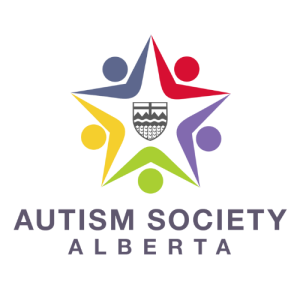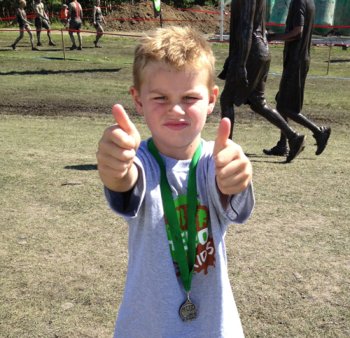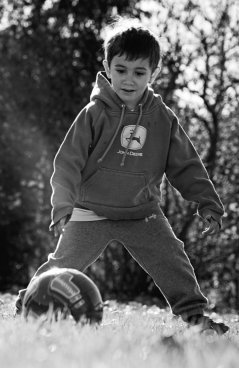Our ASD: The First Year Following Diagnosis
 Oh yes, I shed tears, but I knew I had to get to work. There was so much that I had to learn about. I started reading about autism, applying for the Disability Tax Credit, contacting FSCD, setting up the RDSP and getting him settled into Kindergarten. My pile of paperwork started to grow!
Oh yes, I shed tears, but I knew I had to get to work. There was so much that I had to learn about. I started reading about autism, applying for the Disability Tax Credit, contacting FSCD, setting up the RDSP and getting him settled into Kindergarten. My pile of paperwork started to grow!
Central Alberta Play Group!
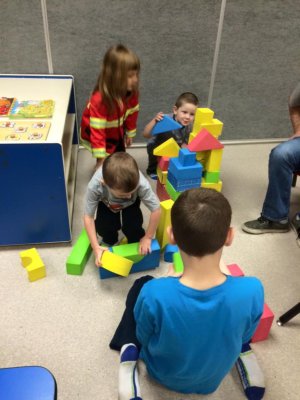
As parents, when we gather for our monthly support groups meetings, we always make a point of taking time to ask those in attendance, “what would you LOVE to see in Red Deer?” We usually have many suggestions, from a Minecraft club to moms’ night out. Parents have consistently inquired about the possibility of a safe space for our children and their siblings to come and play, and for parents to socialize with other likeminded parents. On October 24, we were able to host our first play group!
We had five families attend with parents and siblings! Children played with their parents, and new friends and parents were able to make connections and discuss things that are going on in their family. It was a wonderful success! Thank you so much to Autism Society Alberta for sponsoring this fun family event – we look forward to hosting more in the future!
Friendship
Friends can be very difficult for our girl. At the tender age of six, our Matea tends to gravitate more towards adults. Adults can be understanding, they can usually recognize that they may need to adjust their approach with Matea, and they are predictable. In my mind I know my girl is thinking, “okay, they are going to say Hi to me, and I know I am supposed to say Hi back, and then they will move along….I can do this.”
Every so often in our life we cross paths with amazing people who have raised amazing children. At our weekly “Soccability” practice (Adapted Soccer) we have just such a friend. This young lady has known Matea for over a year now, they have played on three teams together, met at parks, and celebrated each other’s birthdays. For Matea, the most she has been able to offer is parallel play, and the occasional moment of joint attention, but her friend is PERSISTENT. She is excited to see Matea, to run with her, talk to her, to just BE with her. Best of all her friendship is unconditional, even when we are having a rough moment, and doing the best we know how – our friend is cheering Matea on. It is a gift.
Socializing is hard for Matea, she has very few words, and is often terrified of her world. So last week when I saw this:
I know our girl in the pretty pink dress who REFUSES to wear her soccer uniform, is trying. Even though there were no words spoken between the two girls, this small gesture speaks volumes. And when I texted the picture to our friends mom, she was so excited to see this picture of them “being friends”.
We are so thankful for persistent friends, and amazing families that raise awesome and ever so patient children.
Central Alberta Parent Support Group Meeting
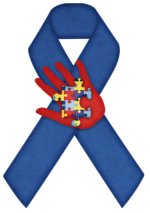
Parent Support Group Meeting
Monday, November 16
6:00 p.m – 8:00 p.m
G.H. Dawe – Activity Room 2, 56 Holt Street, Red Deer
Free childminding is available
Autism Spectrum Disorder and the Criminal Justice System – Being A Victim of a Crime
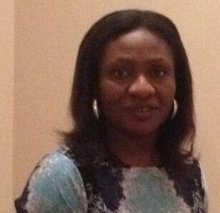
In the previous article I mentioned that people with ASD are more likely to be victims of crime as opposed to being offenders themselves. Certain characteristics of the disorder may make them more likely to be victimized.
This article aims to help you if you have an ASD and you are a victim of a crime. It may be useful for caregivers as well.
The ‘Victims of Crime Protocol’ is a set of services and procedures which the Criminal Justice System provides to all victims. It is important that you let people who work in the CJS know as soon as possible should you wish to benefit from services within this protocol. The process for a victim of crime in Alberta and a listing of all help available can be found at the Alberta Government’s Help for Victims of Crime website.
The most important thing for you and your caregiver to do is to make sure that you pass on information about your ASD and any special needs you may have as soon as possible to the police, Victims Services Unit and the Crown Prosecution.
In reporting a crime to the police, you may need the help of a caregiver, a family member or a friend, especially if you find it difficult to make a call or visit the police station. Depending on the situation, a police officer may come out to your home or to the most comfortable location for you to take a statement. If you require a supporting adult, an interpreter, a Speech and Language Therapist or communication device, let the officer know. In court, should you be required to give a testimony, it is important this be made known to the Crown a Prosecution and the Judge. The carrying of ‘Autism Bracelets" or "Autism Cards" come in very useful in situations like this so that all the information about you and any special needs are easily available.
You may request a quiet room for the interview at the police station because of sensitivity to noise and the need for a low arousal environment. You may prefer to be prepared for the process by way of pictures, social stories or other aids. Being able to predict what happens to individuals with ASD goes a long way in alleviating anxiety.
As indicated in the Victims of Crime Protocol, ”There are Victim Services units in communities across Alberta. Victim services units are staffed with trained, caring people who’ll help you throughout the criminal justice process. Victim services advocates will treat you with courtesy, compassion and respect”. It is important that you make contact with your local Victim’s Services Unit and inform them that you have an ASD, along with any other special needs.
The assigned victim services advocate will explain the courtroom process and guide you through the steps leading up to a hearing. They will give you contact information to the Crown Prosecutor. They can also help you with a court orientation session in order to familiarize you with the court and the process. This process may be helpful in reducing or relieving anxiety associated with attending court.
The Victim Services Unit should also provide you with information about the outcomes of court hearings, and whether the accused perpetrator of the crime is eventually convicted or acquitted.
Dr. Funto Orimalade, MBBS MRCPsych LLM
CCT Forensic Psychiatry (UK)
Forensic Psychiatrist
Special Interest in Intellectual Disabilities and Autism Spectrum Disorders
Forensic Assessment & Community Services (FACS)
10225 106 Street
Edmonton
Alberta T5J 1H5
We Want to Hear From You!
Daddy/Son Club – No Girls A-wowwed!
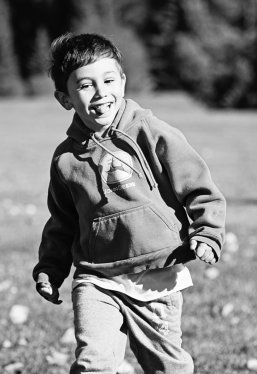
My husband has never played soccer. He never really watches soccer. In fact, the only thing I can confidently say he’s done that is ‘soccerish’ is bought an Adidas shirt – and probably only because it was on sale. Football and hockey are the sports of choice in our home (unless the Jay’s are on a winning streak, then we jump on the baseball bandwagon), but soccer is certainly not the sport I would have expected to light up my husband’s face.
On Monday evening as I was laying out my scattered ‘drive-around’ schedule to get both children to their Tuesday evening activities, Mr. P excitedly declared he was officially on Captain duty every Tuesday night from now until March.
Mr. P is one heck of a good daddy – but this was strange, all the same.
“I should be there with him,” he told me. “This is something he and I should do together.”
I nodded, shrugged my shoulders and said, “Perfect – I’ll take the big kid to dancing then.” I left it at that, but as I walked away from the conversation, my heart was feeling squeezed.
I’ve been pretty lucky with the big kid. She likes the stuff I like. Even better than that, she’s freaking awesome at the stuff I like. Her bedroom is littered with medals and trophies, leotards and smelly leather shoes. She comes home from school and says things like, ‘I’m gonna sign up for the spring play’ or ‘is it okay if I join the cross country running team?’ When it comes to finding things to bond over, the big kid and I are all set. Pick a geeky activity, and we’re on it. She joins the team and works her butt off, and I’m cheering from the sidelines like a looney bird on bath salts.
Not to say Mr. P isn’t actively involved in our little girl’s achievements – he’s likely the proudest daddy out there. But he didn’t grow up talking about pointed toes and set design. His youthful world was made up of organized sports – hockey and football, rugby and softball. When he speaks about his dad, it’s usually in relation to some kind of sport – scratch that – it’s always in relation to some kind of sport.
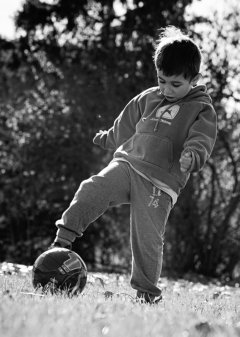
While I’ve been getting closer and closer with my daughter during our times spent diving into her youthful ambitions, my husband has not been sharing dreams with my son of try-outs, tournaments or Olympic medals. They have never shared moments void of the women in their life. Their Daddy-Son Club has always allowed room for us girls.
Now, Mr. P has never said a thing about this. He never would. In fact, he’s probably mad at me for writing this because he accepts, loves and appreciates our son as he is (and he is awesome). But for a man who grew up using sports as a form of communication, he hasn’t been able to use it as a tool with his own son.
Which brings me back to soccer.
When you send your kid to an adapted program, your expectations are only that you get them there. What happens when you get through those doors is far less significant than getting them through those doors. Sometimes the kids run around in circles, sometimes they cry, sometimes they steal balls from other kids – or worse, throw them in their faces. (Every parent is in the same boat and as we calmly redirect our children, we look at each other with the ‘I’m so glad you get it’ expression shared by special needs families.)
But sometimes something clicks and on Tuesday, something clicked when the Captain discovered he likes soccer.
When I arrived home with the big kid on Tuesday evening, I was greeted by two equally animated men. One was speaking in an excited gibberish about kicking a ball – and the older one, (with a goofy grin on his face), was wildly nodding his head and chanting ‘He did so well! He did so well!’ The Captain called his grandparents to tell them about his exciting evening and used spectacular language skills to share the story. With crystal clear words he told me “the coach says I need to keep the ball close to my body” and my husband showed us videos of our son’s keen interest in this intriguing new sport.
And I could see it happened. They found their ‘thing’.
Even if it’s short lived, for now it’ll be used as their special form of communication.
This fall marks the official beginning of the Daddy/Son Club and this time, (as the Captain would say), no girls are a-wowwed.
Autism Canada Unveils Its New PSA
Autism Canada has unveiled its new Public Service Announcement. The PSA has an inspiring message about autism acceptance, and encourages people to “see the spectrum differently”. Click here to watch it.
It’s Everyone’s Halloween

With Halloween upon us, please keep in mind, a lot of little people will be visiting your home. Be accepting. The child who is grabbing more than one piece of candy may have poor fine motor skills. The child who takes forever to pick out one piece of candy may have motor planning issues. The child who does not say trick or treat or thank you may be non-verbal. The child who looks disappointed when they see your bowl might have an allergy. The child who isn’t wearing a costume at all might have a sensory issue (SPD) or autism. That BIG boy might appear to be an adult, but may be developmentally delayed. Choose your words wisely. Be nice. Be patient. Its everyone’s Halloween.
